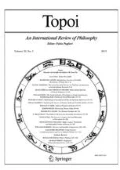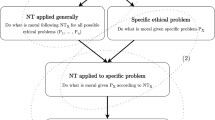Abstract
According to a widely accepted conceptual model, principles play essential roles in moral reasoning: it is asserted that they hold universally and cannot be avoided in the justification of human action and belief. This paper challenges that view. It argues that, though some principles play such substantive roles, most do not. They can be characterized instead as being fragile or defeasible, i.e., they are capable of being weakened, voided or undone. The claim is made that it is the pressures exerted by particular cases of moral dilemmas that are the sources of such fragility. The paper contains detailed examples illustrating how the process of defeasibility, including a retreat into moral vacuity, arises from such pressures.
Similar content being viewed by others
Author information
Authors and Affiliations
Rights and permissions
About this article
Cite this article
Stroll, A. The Fragility of Moral Principles. Topoi 17, 137–147 (1998). https://doi.org/10.1023/A:1006041222994
Issue Date:
DOI: https://doi.org/10.1023/A:1006041222994




